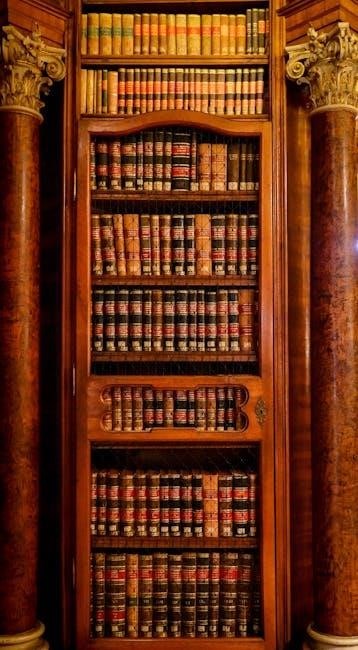World history study guides provide comprehensive resources for understanding global events‚ cultural interactions‚ and historical developments. They offer structured frameworks for analyzing patterns and connections across time and regions‚ helping students develop critical thinking and contextual understanding of human experiences.
1.1 The Importance of Studying World History
Studying world history fosters global awareness‚ cultural empathy‚ and critical thinking. It reveals recurring patterns‚ interconnectedness of societies‚ and the evolution of ideas. Understanding historical contexts helps address contemporary challenges‚ promoting informed decision-making and a deeper appreciation of human experiences across time and regions.
1.2 Key Themes in World History
Key themes in world history include cultural exchange‚ technological progress‚ political empires‚ and religious influences. These themes highlight the interconnectedness of societies‚ tracing how ideas‚ goods‚ and beliefs have shaped global development. They provide a framework for understanding long-term patterns and transformations across diverse regions and time periods.
1.3 Historical Thinking Skills
Historical thinking skills involve analyzing evidence‚ interpreting sources‚ and understanding context. These skills enable students to evaluate causation‚ compare perspectives‚ and synthesize information. They foster critical thinking‚ helping learners connect past events to broader themes and developments‚ while encouraging nuanced interpretations of historical narratives and their relevance to contemporary issues.
Ancient Civilizations
Ancient civilizations‚ such as Mesopotamia‚ Egypt‚ China‚ Greece‚ and Rome‚ laid the foundation for human progress. They developed writing‚ governance‚ and cultural advancements that shaped global history.
2.1 Mesopotamia and the Fertile Crescent
Mesopotamia‚ known as the “cradle of civilization‚” thrived in the Fertile Crescent between the Tigris and Euphrates rivers. It pioneered innovations like cuneiform writing‚ the wheel‚ and complex governance systems‚ laying the groundwork for urbanization and trade networks that shaped early human societies and cultural development.
2.2 Ancient Egypt and the Nile Valley
Ancient Egypt flourished along the Nile River‚ relying on its annual floods for agriculture. It developed a sophisticated society known for pyramids‚ hieroglyphs‚ and a complex pantheon of gods. The Nile’s fertility supported urban centers‚ enabling advancements in engineering‚ art‚ and governance‚ while its religious and cultural practices left a lasting legacy in human history.
2.3 Early Chinese Civilizations
Early Chinese civilizations thrived along the Yellow and Yangtze rivers‚ fostering agriculture and urban development. The Xia‚ Shang‚ and Zhou dynasties established foundational political and cultural systems. Confucianism and Daoism emerged‚ shaping philosophy and governance. Innovations like the compass‚ gunpowder‚ and paper highlighted their technological prowess‚ leaving a lasting impact on global history and cultural advancement.
2.4 Ancient Greece and Rome
Ancient Greece laid the groundwork for Western civilization through democracy‚ philosophy‚ and the arts. The Roman Empire expanded these ideas‚ establishing legal systems and infrastructure. Both civilizations left enduring legacies in governance‚ architecture‚ and culture‚ shaping modern societies and influencing global development for centuries to come.
2.5 The Decline of Ancient Civilizations
The decline of ancient civilizations‚ such as Rome and others‚ often resulted from internal decay‚ external invasions‚ economic collapse‚ and environmental factors. These events led to political fragmentation and cultural shifts‚ reshaping global dynamics and influencing the rise of new societies‚ while leaving lasting legacies in governance and culture.
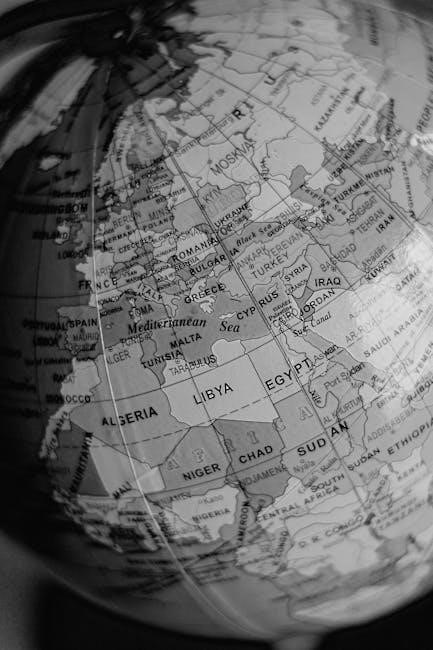
The Middle Ages
The Middle Ages saw the rise of feudalism‚ the influence of the Church‚ and the spread of Christianity and Islam‚ shaping medieval culture and society.
3.1 Feudalism and the Medieval Period
Feudalism was a hierarchical system defining medieval society‚ with lords granting land to vassals in exchange for loyalty and service. This structure shaped political‚ economic‚ and social life‚ emphasizing obligations and reciprocity. The Church played a central role‚ while peasants worked the land‚ forming the backbone of the feudal economy and medieval culture.
3.2 The Crusades and Their Impact
The Crusades were a series of religious wars initiated by the Catholic Church‚ aiming to reclaim the Holy Land from Muslim rule. Lasting from the 11th to the 13th century‚ they involved Christians‚ Muslims‚ and Jews in conflicts that reshaped religious‚ cultural‚ and political landscapes.
These wars fostered both hostility and cultural exchange‚ influencing the rise of military orders and shifting power dynamics in Europe and the Middle East‚ while leaving a lasting legacy of tension and cooperation between faiths.
3.3 The Black Death and Its Consequences
The Black Death‚ a pandemic that ravaged Europe in the 14th century‚ caused unprecedented population decline‚ social upheaval‚ and economic disruption. It led to significant changes in labor dynamics‚ weakening the feudal system and fostering a shift toward wage labor. The crisis also influenced cultural and religious movements‚ reshaping medieval society.
3.4 The Byzantine Empire and Its Legacy
The Byzantine Empire‚ successor to the Roman Empire‚ preserved Roman law‚ Christianity‚ and Greek culture. Its capital‚ Constantinople‚ was a hub of trade and learning. The empire’s legal and administrative systems influenced medieval Europe‚ while its artistic and religious traditions shaped Orthodox Christianity‚ leaving a lasting legacy in Eastern Europe and beyond.
3.5 The Rise of the Mongol Empire
The Mongol Empire‚ founded by Genghis Khan‚ rapidly expanded through military prowess and strategic alliances. Its vast territories connected Europe‚ Asia‚ and Africa‚ facilitating trade and cultural exchange. The empire’s centralized administration‚ merit-based leadership‚ and efficient communication systems ensured stability. However‚ its decline began with internal fragmentation and external pressures‚ leaving a lasting impact on global history.

The Renaissance and Reformation
The Renaissance sparked cultural and intellectual revival in Europe‚ fostering art‚ science‚ and humanism. The Reformation challenged Catholic Church authority‚ leading to Protestantism’s rise and religious diversity across the continent.
4.1 The Renaissance in Europe
The Renaissance‚ spanning the 14th to 17th centuries‚ was a cultural and intellectual movement that revived classical knowledge and fostered humanism. It flourished in city-states like Florence and Venice‚ producing iconic figures such as Leonardo da Vinci and Michelangelo. This era saw advancements in art‚ literature‚ science‚ and education‚ laying the groundwork for the Reformation and the Scientific Revolution.
4.2 The Protestant Reformation
The Protestant Reformation‚ initiated by Martin Luther in 1517‚ challenged Catholic Church authority‚ sparking religious and social change across Europe. It emphasized individual faith‚ scripture‚ and criticized indulgences. Key figures like Luther‚ Calvin‚ and Henry VIII led to the rise of Protestantism‚ reshaping religious unity and influencing political landscapes‚ while print technology spread reform ideas widely.
4.3 The Counter-Reformation
The Counter-Reformation‚ led by the Catholic Church‚ aimed to address Protestant challenges and reform internal practices. The Council of Trent (1545–1563) reaffirmed Catholic doctrine‚ while Jesuits like Ignatius Loyola promoted education and missionary work. This period also saw the rise of powerful Catholic monarchs and the Inquisition‚ strengthening Church authority and revitalizing Catholic identity across Europe and beyond.
4.4 The Scientific Revolution
The Scientific Revolution (16th–18th centuries) transformed Europe by challenging traditional beliefs and promoting empirical research. Figures like Copernicus‚ Galileo‚ Newton‚ and Bacon advanced astronomy‚ physics‚ and the scientific method. This era laid the groundwork for modern science‚ fostering critical inquiry and intellectual shifts that influenced Enlightenment thought and societal progress.
4.5 The Enlightenment and Its Ideas
The Enlightenment emphasized reason‚ individual rights‚ and scientific progress‚ shaping modern thought. Thinkers like Voltaire‚ Rousseau‚ and Locke advocated for liberty‚ equality‚ and democracy‚ influencing revolutions and political reforms. Their ideas promoted secularism‚ education‚ and social contract theory‚ laying the foundation for contemporary democratic values and intellectual freedom.
The Age of Exploration
The Age of Exploration saw European explorers like Columbus‚ Magellan‚ and da Gama embark on voyages‚ driven by quests for new trade routes‚ wealth‚ and knowledge. These journeys led to the Columbian Exchange‚ reshaping global cultures‚ economies‚ and populations‚ while profoundly impacting indigenous societies worldwide.
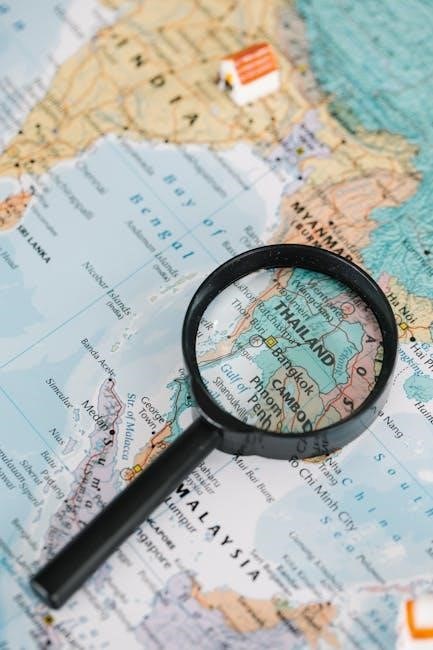
5.1 European Explorers and Their Voyages
European explorers like Columbus‚ Magellan‚ and da Gama led voyages driven by the quest for new trade routes‚ wealth‚ and knowledge. Their journeys‚ often funded by monarchs‚ resulted in the discovery of new lands‚ the Columbian Exchange‚ and the establishment of global connections‚ reshaping cultures‚ economies‚ and societies across the world.
5.2 The Columbian Exchange
The Columbian Exchange was a widespread transfer of plants‚ animals‚ and cultures between the Americas and the Old World. It introduced crops like maize and potatoes to Europe‚ boosting populations‚ while horses and diseases transformed the Americas. This exchange profoundly impacted global ecosystems‚ economies‚ and societies‚ shaping the modern world’s biodiversity and cultural diversity.
5.3 The Impact of Exploration on Indigenous Peoples
Exploration led to devastating consequences for indigenous populations‚ including population decline due to diseases‚ displacement‚ and cultural disruption. European colonization introduced new technologies and practices‚ but often at the cost of native traditions and land sovereignty‚ reshaping the social and environmental landscapes forever.
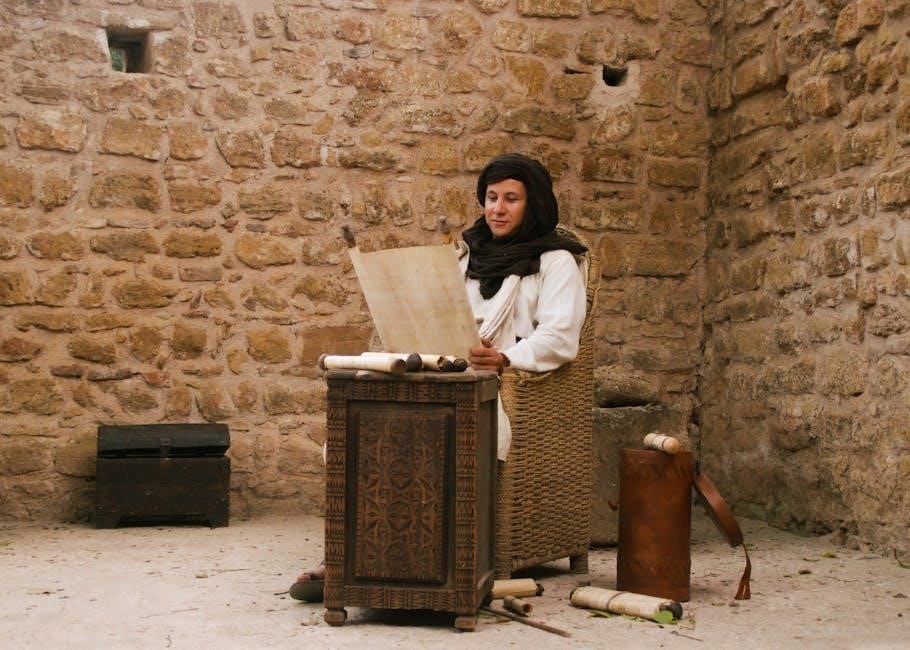
The Modern Era
The modern era encompasses transformative events like the Industrial Revolution‚ rise of nationalism‚ and global conflicts‚ shaping societies and economies while fostering technological advancements and political ideologies.
6.1 The American and French Revolutions
The American and French Revolutions were pivotal events in modern history‚ driven by Enlightenment ideals of liberty and equality. These revolutions reshaped political landscapes‚ establishing democratic principles and inspiring global movements for independence and self-governance‚ leaving lasting legacies in modern political thought and institutional frameworks worldwide.
6.2 The Industrial Revolution
The Industrial Revolution‚ spanning the late 18th to early 19th centuries‚ transformed societies through mechanized production‚ steam power‚ and factory systems. It originated in Britain‚ spreading globally‚ and drove economic growth‚ urbanization‚ and technological innovation. While it improved living standards‚ it also led to labor exploitation‚ environmental degradation‚ and social inequality‚ reshaping modern society.
6.3 Nationalism and Imperialism
Nationalism and imperialism were central to the modern era‚ shaping global politics and economies. Nationalism fueled identity-based movements‚ while imperialism drove colonial expansion. Both phenomena were rooted in economic competition‚ political rivalries‚ and cultural ambitions‚ leading to territorial disputes and conflicts that reshaped the world order‚ leaving lasting legacies in international relations and cultural identities.
World Wars
World Wars were global conflicts that reshaped societies‚ economies‚ and political systems. They highlighted the devastating consequences of nationalism‚ imperialism‚ and militarism‚ altering the modern world.
7.1 Causes and Key Events of World War I
Militarism‚ alliances‚ imperialism‚ and nationalism sparked World War I. The assassination of Archduke Franz Ferdinand ignited the conflict‚ leading to the involvement of major powers; Key events included the Battle of the Somme‚ Verdun‚ and the introduction of trench warfare. The Treaty of Versailles ended the war‚ imposing harsh penalties on Germany;
7.2 The Interwar Period and the Rise of Fascism

The interwar period saw economic instability and political upheaval‚ fostering the rise of fascist ideologies. Mussolini’s Italy and Hitler’s Germany capitalized on post-war grievances‚ promising stability and national revival. The Treaty of Versailles’ harsh terms on Germany fueled resentment‚ enabling Hitler’s ascent. Fascist regimes emphasized nationalism and authoritarian control‚ reshaping global politics.
Propaganda and suppression of opposition were central to fascist rule. The interwar years also witnessed the formation of alliances that would eventually lead to World War II‚ as fascist powers sought to expand their influence and challenge the post-war order. This period marked a dramatic shift in global power dynamics.
7.3 Causes and Key Events of World War II
World War II arose from unresolved Treaty of Versailles grievances‚ economic instability‚ and the aggressive expansion of fascist regimes. Germany‚ under Hitler‚ invaded Poland in 1939‚ prompting Britain and France to declare war. Japan’s imperial ambitions in Asia and the Pacific further escalated tensions.
Key events included the Battle of Stalingrad‚ D-Day‚ and the atomic bombings of Hiroshima and Nagasaki. The war ended with the Axis powers’ defeat in 1945‚ reshaping global power structures and leading to the Cold War. The Holocaust and other atrocities remain pivotal historical lessons.
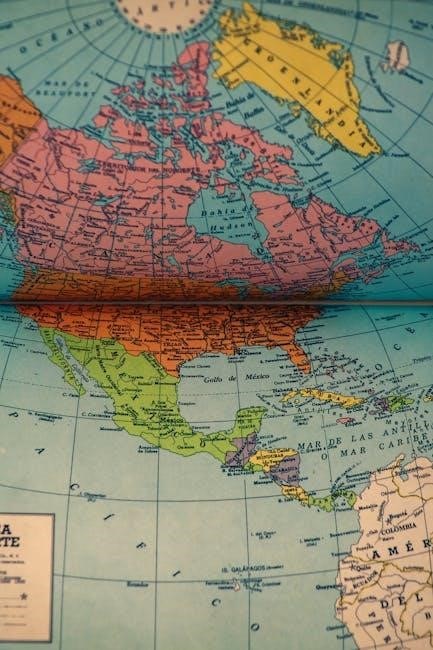
The Cold War
The Cold War was a geopolitical rivalry between the US and USSR‚ marked by proxy wars‚ arms races‚ and ideological conflicts‚ shaping global politics until its end in 1991.
8.1 Origins of the Cold War
The origins of the Cold War trace back to post-WWII tensions between the United States and the Soviet Union. Disagreements over political ideologies‚ territorial control‚ and economic systems fueled mistrust‚ leading to the division of Europe and the emergence of the Iron Curtain‚ symbolizing the start of decades-long ideological conflict.
8.2 The Arms Race and Space Race
The Cold War intensified through the arms race‚ as the U.S. and USSR sought nuclear supremacy‚ and the space race‚ symbolized by Sputnik and Apollo missions. These competitions showcased technological prowess‚ fueled innovation‚ and reflected ideological rivalry‚ becoming central to Cold War propaganda and global influence.
8.3 Proxy Wars and Decolonization
During the Cold War‚ proxy wars in regions like Vietnam and Afghanistan allowed superpowers to exert influence without direct conflict. Decolonization led to newly independent nations aligning with either the U.S. or USSR‚ shaping global politics and creating a complex landscape of alliances and tensions.
8.4 The Fall of the Berlin Wall and End of the Cold War
The fall of the Berlin Wall in 1989 symbolized the collapse of Soviet influence in Eastern Europe. It marked the beginning of the end of the Cold War‚ leading to German reunification and the dissolution of the Soviet Union by 1991. This era saw a shift toward democracy and the end of bipolar global tensions.
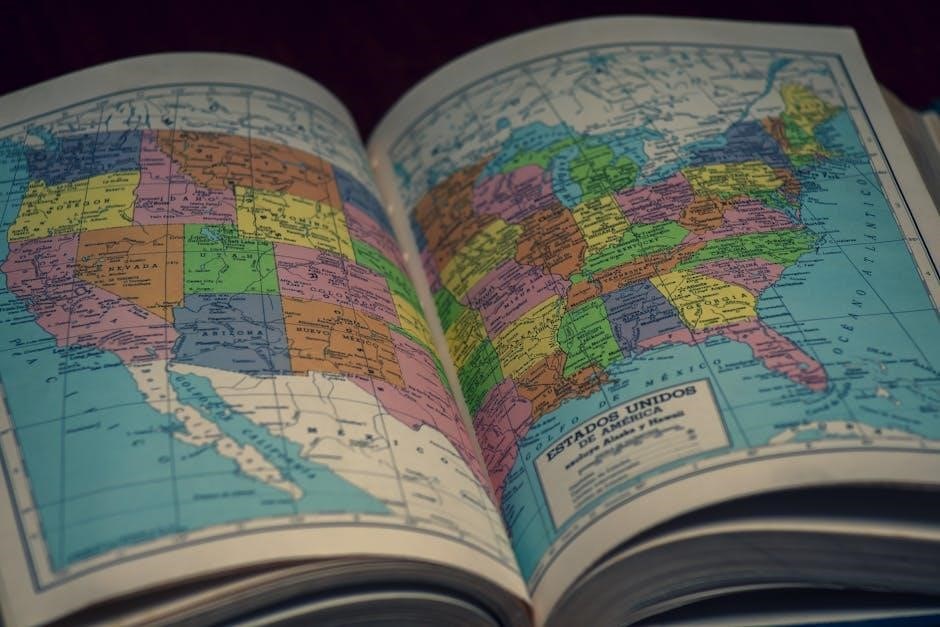
Contemporary History
Contemporary history explores global events from the late 20th century to today‚ focusing on globalization‚ technological advancements‚ terrorism‚ and climate change‚ shaping modern societies and challenges.
9.1 Globalization and Its Effects
Globalization has profoundly shaped modern societies‚ fostering economic interconnectedness and cultural exchange worldwide. It drives technological advancements‚ international trade‚ and cultural diversity but also sparks concerns about inequality‚ cultural homogenization‚ and environmental degradation. Understanding globalization’s multifaceted impacts is crucial for analyzing contemporary challenges and opportunities.
9.2 The Rise of Terrorism and Its Impact
The rise of terrorism has significantly impacted global security‚ causing widespread fear and instability. It disrupts political stability‚ economies‚ and social structures‚ often leading to displacement and loss of life. Terrorism’s emotional and psychological effects on victims and communities are profound‚ reshaping international policies and responses to threats.
9.3 Climate Change and Its Historical Context

Climate change has historical roots tied to industrialization and globalization‚ with human activities altering ecosystems and greenhouse gas emissions rising significantly since the Industrial Revolution. This shift has led to environmental challenges‚ prompting global efforts to address sustainability and mitigate future impacts on societies and natural systems.
